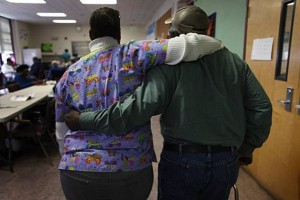Aging in place and aging in community has been promoted as innovative and human centered concepts that keep people longer out of institutional care. Heralded as the solution for the highly individualistic and demanding members of the baby boomer generation this way of aging is already has been practiced in low income communities for a long time. Here, not so much because people want to stay in their homes but because they have no other choice. Key building blocks for aging in community are Senior Centers and Adult Day Health Centers. Sheila Hembury the Program Director of Bay View Hunters Point Multipurpose Senior Services (BHPMSS) in San Francisco talked at last AHWGO’s forum about the challenges to provide these services to their community. BHPMSS has a Senior Center and offers Adult Day Health Care, now called “Community-Based Adult Services” to a largely African American population. They have done so with tenacity and a vision for more than 40 years. Services include medical care to elderly, disabled and frail adults, who get help from nurses, psychiatrists, physical and occupational therapists and other experts, for three to five days a week, at the center. They operate under extreme budget constraints and over the last two years had to spend most of their energy on survival, battling budget cuts and more restrictive eligibility rules for their clients. Without comprehensive senior services many elder in low income communities would have to be moved into nursing homes – at a much higher cost for the state (approx. $6000 vs $2000 monthly cost). The reality though is that there are not enough nursing home beds in San Francisco and seniors end up wherever there is room for them – if there is room – the opposite of aging in community.
The other logical step in an ‘aging in community’ concept is to provide senior affordable housing that is integral to the neighborhood and offers elders for whom living at home or keeping home becomes at one point cumbersome or untenable a new home. Surprisingly though this is not necessarily possible now. Most affordable housing is federally funded and units have to be distributed through a lottery system. That means, there is not guarantee for eligible seniors in the community to have a home there. Unless the community gets very well organized and ‘gets out the vote’ there is no place for them.
BHPMSS has embarked on their next milestone, building supported, affordable housing, an ‘Aging Campus’ at Hunters Point. They know the lottery game. May such housing benefit the elder now and then in their community. May the concept of aging in community find its way into funding regulations and policy making.
